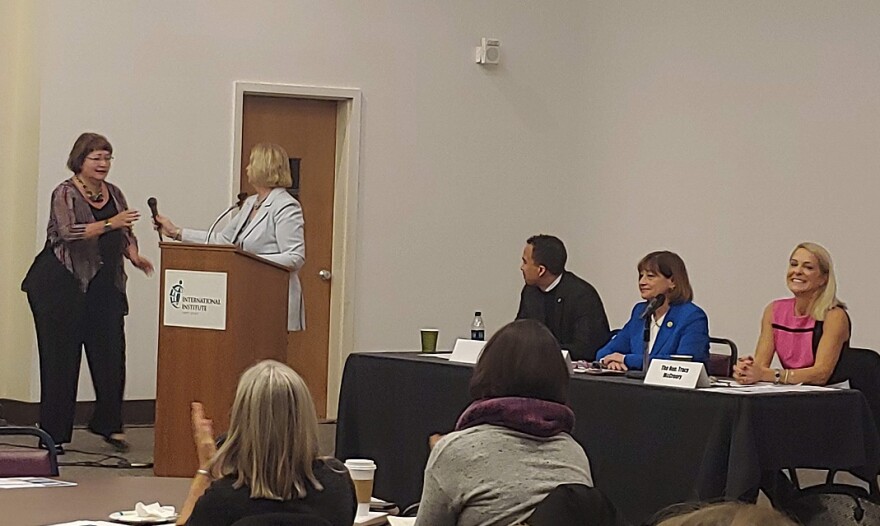Immigrants contribute more than a billion dollars to state and federal taxes and account for billions more in spending power, according to Betsy Heller Cohen of the St. Louis Mosaic Project.
On Wednesday, Cohen moderated a panel on the economic impact of “foreign-born Missourians” at the International Institute of St. Louis.

Cohen said there are more than 250,000 immigrants in Missouri. She said roughly 135,000 immigrants live in the St. Louis region, which includes St. Louis County, St. Charles County, and the metro-east.
The data the group provided audience members comes from New American Economy, an entity launched by Michael Bloomberg and Rupert Murdoch.
With Trump administration policies on migrants from Latin America and Muslim countries stirring debate, organizers of the panel wanted to consider the impact immigrants have on regional economies.
“Particularly in a region like ours, when we have less than the national unemployment, workforce issues and making sure that we find ways to both welcome foreign-born people and use their skills to fill our economy, to fill the jobs. These are all extremely important goals,” Cohen said.
Mauricio Gobbo is one of those immigrants. He is originally from Brazil and recently became a U.S. citizen. He said he attended the discussion to learn about how he could connect with lawmakers to talk about the issues he cares about.
“There’s a lot of goodwill who have helped us and support us,” Gobbo said. “But, there is a lot of people that when you slip on your accent, when you say something a little bit different, when you act different, they look like, 'Oh, this person is weird.'”
Welcome mat
Missouri lawmakers are on fall break, but Sen. Jill Schupp, D-Creve Coeur, and Rep. Tracy McCreery, D-St. Louis, told the audience they are working to ensure immigrants feel welcome in their districts. McCreery represents the district Schupp’s old district when she was in the state House.
The lawmakers focused a lot of their attention on how they personally engage immigrant communities through health care clinics in their district or meeting constituents door-to-door. Both legislators notably expressed angst over proper etiquette when meeting someone of a different culture or religion.
Other topics at the discussion centered on national education and labor policies that could affect area immigrants — especially as it pertains to the children of immigrants who may not have been born in the U.S., otherwise known as Dreamers.
“Many of these immigration policies, as you know, take place at the federal level,” Schupp said. “I think what Missouri does is, it follows suit.”
Schupp and McCreery are a part of the minority party in Missouri, which has a Republican administration. After the 2018 midterms, both U.S. senators from Missouri are also Republicans.
Border security
Republican Sen.-elect Josh Hawley spoke about border security while campaigning in early November. He admonished his opponent Claire McCaskill for her views on immigration.
“Border security is national security and it’s about the rule of law,” Hawley said, during the campaign. “We need the rule of law on our southern border. We need to secure that border."
One attendee at the International Institute event questioned the democratic lawmakers on the national policy on immigrants coming from Latin America and Mexico.
“Missouri ain’t the first place people are going,” Schupp said, when you consider the number of immigrants living in Missouri compared to other states.
“I think this issue is really a federal issue,” she added. “But how Missouri opens its doors to people who are coming in here and whether this nation is willing to open its doors, I think we all need to be speaking up and speaking out about it.”
Ashley Lisenby is part of the public radio collaborative Sharing America, covering the intersection of race, identity and culture. This new initiative, funded by the Corporation for Public Broadcasting, includes reporters in Hartford, St. Louis, Kansas City, and Portland, Oregon. Follow Ashley on Twitter @aadlisenby.




